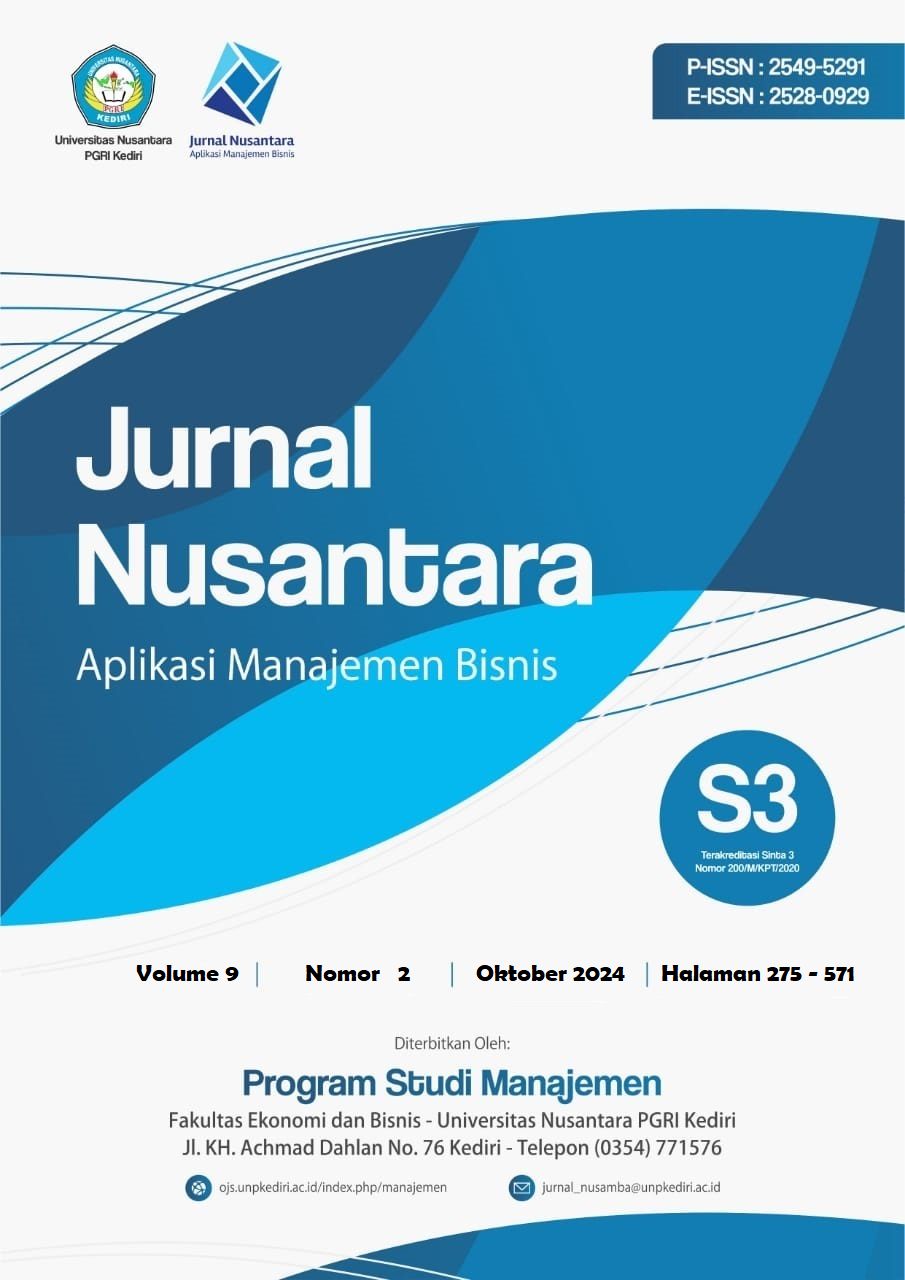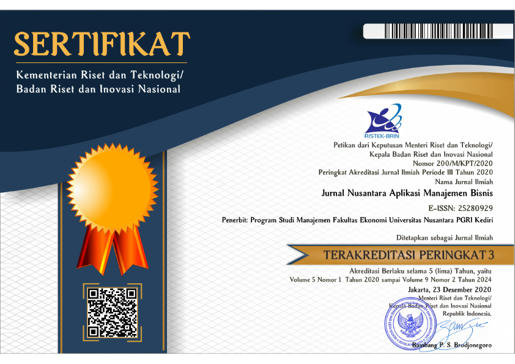Kepemimpinan Strategis Dan Keberlanjutan UKM: A Systematic Literature Review
DOI:
https://doi.org/10.29407/nusamba.v9i2.21197Keywords:
Strategic Leadership, Sustainability, SME’s, Systematic Literature ReviewAbstract
Research aim: The purpose of this paper is to identify and analyze some of the key literature on strategic leadership and SME coaching
Approach: This paper is a Systematic Literature Review using the Science Direct database. Based on several stages in the systematic review method using the SPAR-4-SLR Protocol, 94 key articles from the Q1 category were found based on the Scimago Journal Ranking (SJR)
Research Finding: This study found that 8 scientific groups support research on strategic leadership and SME sustainability
Theoretical contribution: Many studies on SME sustainability have been carried out, but studies that look at the direct relationship of strategic leadership to SME sustainability are still very rare.
Practitioner implication: This research provides more systematic knowledge and understanding for SME managers and academicians regarding improving SME sustainability related to their strategic leadership roles.
Research limitation: This study also has limitations on the journal database, which is only sourced from Science Direct. The next study is expected to be expanded with other database sources such as scopus, Emerald, springer, and others for a more comprehensive study.
Downloads
References
REFERENSI
I. A. Dar and M. Mishra, “Dimensional Impact of Social Capital on Financial Performance of SMEs,” J. Entrep., vol. 29, no. 1, pp. 38–52, 2020.
N. A. Omar, A. S. Kassim, N. U. Shah, S. S. Alam, and C. A. Che Wel, “The influence of customer value co-creation behavior on SME brand equity: An empirical analysis,” Iran. J. Manag. Stud., vol. 13, no. 2, pp. 165–196, 2020.
B. M. Sopha, F. Jie, and M. Himadhani, “Analysis of the uncertainty sources and SMEs’ performance,” J. Small Bus. Entrep., vol. 33, no. 1, pp. 1–27, 2021.
M. K. Hu and D. M. H. Kee, “Fostering sustainability: reinventing SME strategy in the new normal,” foresight, vol. 24, no. 3/4, pp. 301–318, Jan. 2022.
A. M. Baabdullah, A. A. Alalwan, E. L. Slade, R. Raman, and K. F. Khatatneh, “SMEs and artificial intelligence (AI): Antecedents and consequences of AI-based B2B practices,” Ind. Mark. Manag., vol. 98, pp. 255–270, 2021.
A. Sohal and T. De Vass, “Australian SME’s experience in transitioning to circular economy,” J. Bus. Res., vol. 142, pp. 594–604, 2022.
V. Pereira, M. K. Nandakumar, S. Sahasranamam, U. Bamel, A. Malik, and Y. Temouri, “An exploratory study into emerging market SMEs’ involvement in the circular Economy: Evidence from India’s indigenous Ayurveda industry,” J. Bus. Res., vol. 142, pp. 188–199, 2022.
B. M. Bass, “Does the Transactional - Transformational Leadership Paradigm Transcend Organizational and National Boundaries?,” Am. Psychol., vol. 52, no. 2, pp. 130–139, 1997.
W. G. Rowe, “Creating wealth in organizations: The role of strategic leadership,” IEEE Eng. Manag. Rev., vol. 29, no. 4, pp. 25–37, 2001.
C. Troise, V. Corvello, A. Ghobadian, and N. O’Regan, “How can SMEs successfully navigate VUCA environment: The role of agility in the digital transformation era,” Technol. Forecast. Soc. Change, vol. 174, p. 121227, 2022.
Y. Zhang-Zhang, S. Rohlfer, and A. Varma, “Strategic people management in contemporary highly dynamic VUCA contexts: A knowledge worker perspective,” J. Bus. Res., vol. 144, pp. 587–598, 2022.
P. J. H. Schoemaker, S. Heaton, and D. Teece, “Innovation, dynamic capabilities, and leadership,” Calif. Manage. Rev., vol. 61, no. 1, pp. 15–42, 2018.
S. Chatterjee, R. Chaudhuri, D. Vrontis, and F. Jabeen, “Digital transformation of organization using AI-CRM: From microfoundational perspective with leadership support,” J. Bus. Res., vol. 153, pp. 46–58, 2022.
M. A. Hitt, K. T. Haynes, and R. Serpa, “Strategic leadership for the 21 century,” Bus. Horiz., vol. 53, no. 5, pp. 437–444, 2010.
M. S. Satar and S. Natasha, “Individual social entrepreneurship orientation: towards development of a measurement scale,” Asia Pacific J. Innov. Entrep., vol. 13, no. 1, pp. 49–72, Jan. 2019.
P. J. H. Schoemaker, S. Krupp, and S. Howland, “Strategic leadership: The essential skills,” Harv. Bus. Rev., vol. 91, no. 1–2, 2013.
Y. Kouropalatis, A. Giudici, and O. A. Acar, “Business capabilities for industrial firms: A bibliometric analysis of research diffusion and impact within and beyond Industrial Marketing Management,” Ind. Mark. Manag., vol. 83, pp. 8–20, 2019.
P. Jaskiewicz, J. Block, D. Wagner, M. Carney, and C. Hansen, “How do cross-country differences in institutional trust and trust in family explain the mixed performance effects of family management? A meta-analysis,” J. World Bus., vol. 56, no. 5, p. 101196, 2021.
E. Quansah, K. Moghaddam, S. Solansky, and Y. Wang, “Strategic leadership in SMEs: the mediating role of dynamic capabilities,” Leadersh. Organ. Dev. J., vol. 43, no. 8, pp. 1308–1320, 2022.
A. N. Kiss, A. F. Cortes, and P. Herrmann, “CEO proactiveness, innovation, and firm performance,” Leadersh. Q., vol. 33, no. 3, p. 101545, 2022.
C. Tosun, M. O. Parvez, Y. Bilim, and L. Yu, “Effects of green transformational leadership on green performance of employees via the mediating role of corporate social responsibility: Reflection from North Cyprus,” Int. J. Hosp. Manag., vol. 103, p. 103218, 2022.
W. M. Lim and M. A. Weissmann, “Toward a theory of behavioral control,” J. Strateg. Mark., vol. 00, no. 00, pp. 1–27, 2021.
J. Paul, W. M. Lim, A. O’Cass, A. W. Hao, and S. Bresciani, “Scientific procedures and rationales for systematic literature reviews (SPAR-4-SLR),” Int. J. Consum. Stud., no. April, pp. 1–16, 2021.
V. Jafari-Sadeghi, H. Amoozad Mahdiraji, D. Busso, and D. Yahiaoui, “Towards agility in international high-tech SMEs: Exploring key drivers and main outcomes of dynamic capabilities,” Technol. Forecast. Soc. Change, vol. 174, p. 121272, 2022.
I. Miroshnychenko, A. Strobl, K. Matzler, and A. De Massis, “Absorptive capacity, strategic flexibility, and business model innovation: Empirical evidence from Italian SMEs,” J. Bus. Res., vol. 130, pp. 670–682, 2021.
N. S. Davcik, S. Cardinali, P. Sharma, and E. Cedrola, “Exploring the role of international R&D activities in the impact of technological and marketing capabilities on SMEs’ performance,” J. Bus. Res., vol. 128, pp. 650–660, 2021.
D. Vrontis, G. Basile, M. Simona Andreano, A. Mazzitelli, and I. Papasolomou, “The profile of innovation driven Italian SMEs and the relationship between the firms’ networking abilities and dynamic capabilities,” J. Bus. Res., vol. 114, pp. 313–324, 2020.
M. Saratchandra, A. Shrestha, and P. A. Murray, “Building knowledge ambidexterity using cloud computing: Longitudinal case studies of SMEs experiences,” Int. J. Inf. Manage., vol. 67, p. 102551, 2022.
A. Behl, J. Gaur, V. Pereira, R. Yadav, and B. Laker, “Role of big data analytics capabilities to improve sustainable competitive advantage of MSME service firms during COVID-19 – A multi-theoretical approach,” J. Bus. Res., vol. 148, pp. 378–389, 2022.
I. Khurana, D. K. Dutta, and A. Singh Ghura, “SMEs and digital transformation during a crisis: The emergence of resilience as a second-order dynamic capability in an entrepreneurial ecosystem,” J. Bus. Res., vol. 150, pp. 623–641, 2022.
Y.-Z. Wang, F.-Y. Lo, and S.-M. Weng, “Family businesses successors knowledge and willingness on sustainable innovation: The moderating role of leader’s approval,” J. Innov. Knowl., vol. 4, no. 3, pp. 188–195, 2019.
P. Chaithanapat, P. Punnakitikashem, N. C. Khin Khin Oo, and S. Rakthin, “Relationships among knowledge-oriented leadership, customer knowledge management, innovation quality and firm performance in SMEs,” J. Innov. Knowl., vol. 7, no. 1, p. 100162, 2022.
A. D’Angelo and M. Presutti, “SMEs international growth: The moderating role of experience on entrepreneurial and learning orientations,” Int. Bus. Rev., vol. 28, no. 3, pp. 613–624, 2019.
J. Ferreira, A. Coelho, and L. Moutinho, “Dynamic capabilities, creativity and innovation capability and their impact on competitive advantage and firm performance: The moderating role of entrepreneurial orientation,” Technovation, vol. 92–93, p. 102061, 2020.
X. Wang, M. Dass, D. B. Arnett, and X. Yu, “Understanding firms’ relative strategic emphases: An entrepreneurial orientation explanation,” Ind. Mark. Manag., vol. 84, pp. 151–164, 2020.
S. Adomako and M. Ahsan, “Entrepreneurial passion and SMEs’ performance: Moderating effects of financial resource availability and resource flexibility,” J. Bus. Res., vol. 144, pp. 122–135, 2022.
Downloads
Published
Issue
Section
License
Authors who publish with this journal agree to the following terms:
- Copyright on any article is retained by the author(s).
- The author grants the journal, the right of first publication with the work simultaneously licensed under a Creative Commons Attribution License that allows others to share the work with an acknowledgment of the work’s authorship and initial publication in this journal.
- Authors are able to enter into separate, additional contractual arrangements for the non-exclusive distribution of the journal’s published version of the work (e.g., post it to an institutional repository or publish it in a book), with an acknowledgment of its initial publication in this journal.
- Authors are permitted and encouraged to post their work online (e.g., in institutional repositories or on their website) prior to and during the submission process, as it can lead to productive exchanges, as well as earlier and greater citation of published work.
- The article and any associated published material is distributed under the Creative Commons Attribution-ShareAlike 4.0 International License












